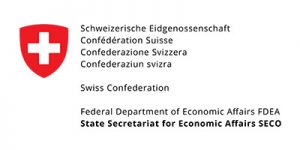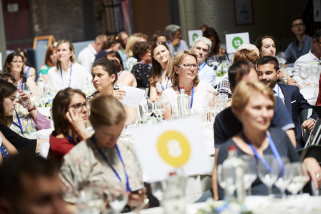Portfolio |
LBCS Colombia – Basic Guidelines for Sustainable Cocoa
Benefits
The market access potential for the farmers is strong as self-assessments help them to be better prepared for certification and increases their ability to communicate with local and international buyers about their sustainability progress, directly using the sustainability diagnostic reports generated through the portal. An offline version of the tool is available and training workshops have been followed by e-learning sessions and webinars to better prepare users. By using the offline version of the LBCS tool, technicians of two organisations have already assessed 250 cocoa producers’ performance on the basic criteria for sustainable cocoa. That first exercise allows the producers to get a first diagnostic of areas in which they need to improve before starting an official certification process.

By using the tool developed by ITC and Swisscontact Colombia, we will be able to bring cocoa producers step-by-step up to speed in issues around sustainability. It provides visibility of what we are doing well about sustainable practices to potential buyers, increasing not only access, but our bargaining power in international markets.”
Background
Although the growing global demand for sustainably produced cocoa presents opportunities for farmers in Latin America, global market access and gaining sustainability certifications still remains a challenge. In response, Swisscontact, as part of their Coexca project, brought together associations of small-scale farmers to help create Basic Guidelines for Sustainable Cocoa (Lineamientos Basicos para un Cacao Sostenible (LBCS)) for both producers and organizations. LBCS allows users to start their journey towards improved sustainability by focusing on fundamental requirements. LBCS was created by taking into account the challenges specifically faced by small producers and therefore set out realistic expectations. The results are verifiable by the Swisscontact Foundation and may be used as a way to promote sustainable products without incurring significant costs.
Collaboration
The T4SD team and Swisscontact initiated a programme to incorporate LBCS into the Standards Map online tool to empower cocoa producers in Colombia and raise awareness around sustainability issues required by certifications such as Fairtrade, UTZ and Rainforest Alliance. Using the online tool, producers will be able to perform self-assessments that allow them to get a first diagnostic report of areas which they need to improve before starting an official certification process. T4SD has also developed an off-line version of the LBCS tool accessible as a mobile application.
Developed by the State Secretariat for Economic Affairs (SECO) and the Swiss Foundation for Technical Development Cooperation (Swisscontact)
The project
Partnership Objective
Launched
Sector(s):

Topics
Find out more about topics that this project has at heart.
Partners
Funded by

Selected projects
More in our portfolio
EU City Award
Showcase how EU cities set an example by having a global impact on sustainable, fair and ethical trade through local efforts.
EU Cities for Fair and Ethical Trade Award
The Award recognizes visionary EU cities which show leadership, and helps connect cities to exchange knowledge and share good practices in order to scale up cities’ efforts and their contribution to the Sustainable Development Goals.
eco.business Fund Sustainability Standards Self-Assessment Tool
The eco.business Fund and the International Trade Centre have joined forces to enable businesses assess compliance against sustainability standards and potentially access preferential bank loans based on their sustainability score






